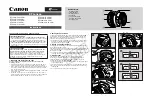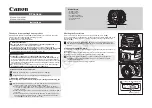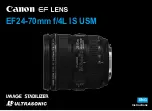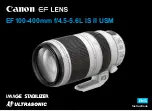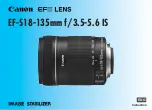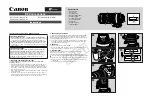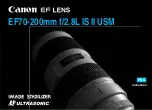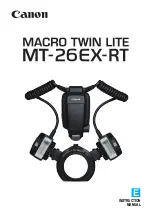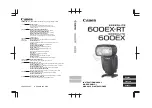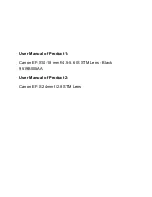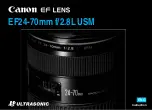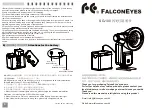
●
❶
●
❷
●
❸
●
❹
●
❻
●
❺
●
❼
Thank you for purchasing a Canon product.
Safety Precautions
1.
Do not look at the sun or a bright light source through the
lens or camera.
Doing so could result in loss of vision. Looking
at the sun directly through the lens is especially hazardous.
2.
Whether it is attached to the camera or not, do not leave the
lens under the sun without the lens cap attached.
This is to
prevent the lens from concentrating the sun’s rays, which could
cause a fire.
Handling Cautions
If the lens is taken from a cold environment into a warm one,
condensation may develop on the lens surface and internal
parts.
To prevent condensation in this case, first put the lens
into an airtight plastic bag before taking it from a cold to
warm environment. Then take out the lens after it has warmed
gradually. Do the same when taking the lens from a warm
environment into a cold one.
1. Mounting and Detaching the Lens
See your camera’s instructions for details on mounting and
detaching the lens.
• After detaching the lens, place the lens with the rear end up to
prevent the lens surface and contacts from getting scratched.
• If the contacts get soiled, scratched, or have fingerprints on them,
corrosion or faulty connections can result. The camera and lens
may not operate properly.
• If the contacts get soiled or have fingerprints on them, clean them
with a soft cloth.
• If you remove the lens, cover it with the dust cap. To attach it
properly, align the lens mount index and the
index of the dust
cap, and turn clockwise. To remove it, reverse the order.
2. Setting the Focus Mode
To shoot in autofocus (AF) mode, set the focus mode switch to AF
❹
.
To shoot in manual focus (MF) mode, set the focus mode switch
to MF, and focus by turning the focusing ring. The focusing ring
always works, regardless of the focus mode.
• After autofocusing in ONE SHOT AF mode, focus manually by
pressing the shutter button halfway and turning the focusing
ring (Full-time manual focus)
❺
.
3. Infinity Compensation Mark
To compensate for shifting of the infinity focus point that results
from changes in temperature.
The infinity position at normal temperature is the point at which the
vertical line of the L mark is aligned with the distance indicator on
the distance scale
❻
.
• For accurate focusing in MF on subjects at infinity distance, look
through the viewfinder while rotating the focusing ring.
4. Infrared Index
The infrared index corrects the focus setting when using
monochrome infrared film. Focus on the subject in MF, then
adjust the distance setting by moving the focusing ring to the
corresponding infrared index mark
❼
.
• Some EOS cameras cannot use infrared film. See the instructions
for your EOS camera.
• The infrared index position is based on a wavelength of 800 nm.
• Be sure to observe the manufacturer’s instructions when using
infrared film.
• Use a red filter also when you take the picture.
Nomenclature
●
①
Distance scale
●
②
Infrared index
●
③
Distance index
●
④
Contacts
●
⑤
Lens mount index
●
⑥
Focus mode switch
●
⑦
Focusing ring
EF Lenses
EF14mm f/2.8L USM
EF20mm f/2.8 USM
EF24mm f/1.4L USM
EF28mm f/1.8 USM
EF35mm f/1.4L USM
EF50mm f/1.4 USM
EF85mm f/1.8 USM
EF100mm f/2 USM
EF200mm f/2.8L USM
Instructions
COP
Y

